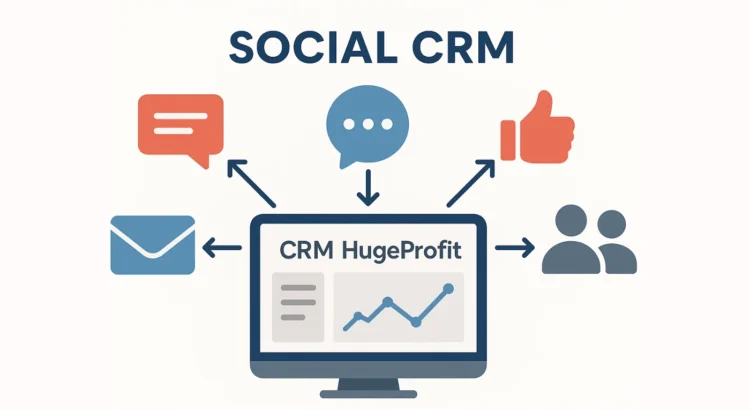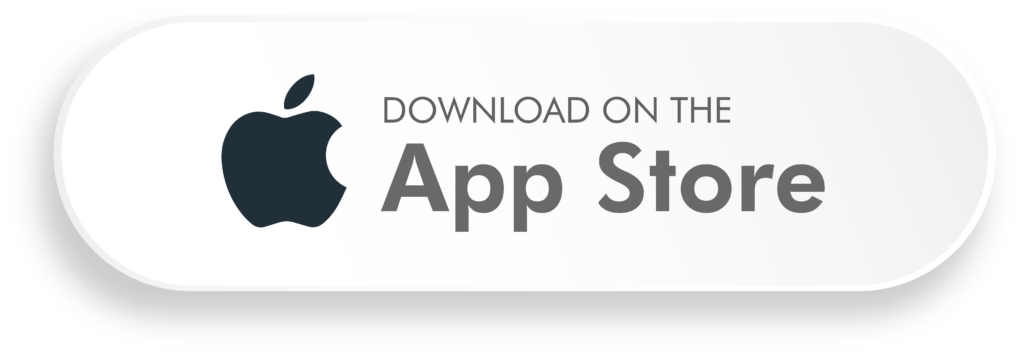In today’s digital world, social networks have become the main channel of communication between businesses and customers. This is where the first contact, support, sales, and feedback occur. However, with the increasing volume of messages, comments, and inquiries, manually processing requests efficiently is becoming increasingly difficult. This is where social CRM comes to the rescue—a system that automates customer interactions on social networks, consolidates all messages into a single database, allows for quick responses, saves communication history, and helps build long-term relationships with the audience.
What is Social CRM and Why is it Important for Modern Business
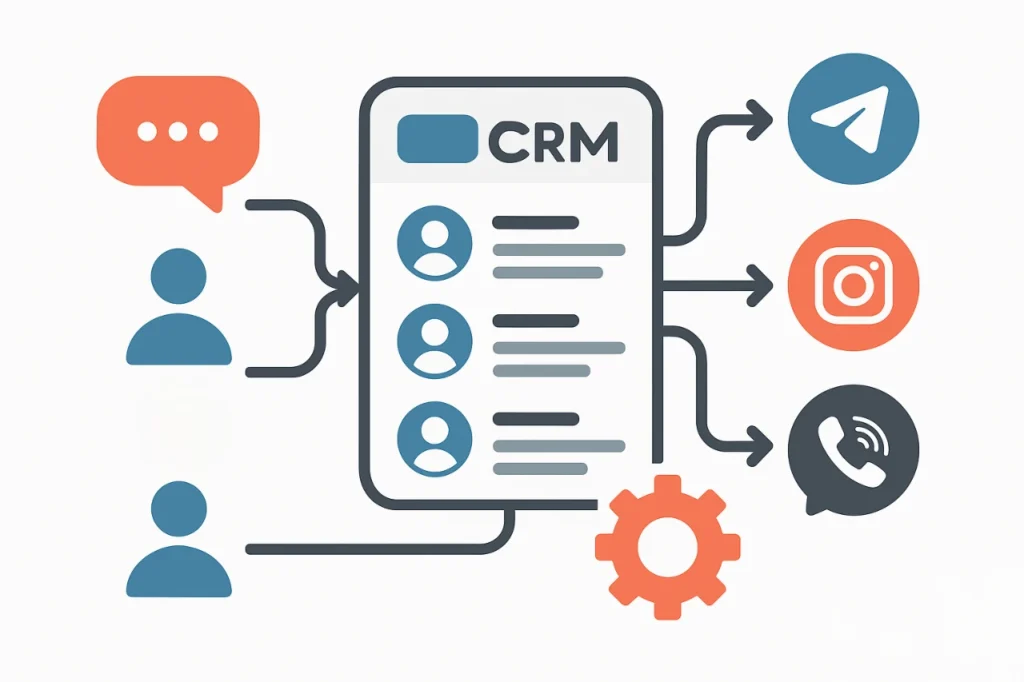
In a world where social networks have become an integral part of everyday life, companies are obliged to be present where their customers are. However, merely having a page on Facebook or Instagram is no longer sufficient. To effectively interact with the audience, a systematic approach to communication processes is necessary. This is where social CRM comes into play—a powerful tool that allows for the automation and centralization of all interactions from social networks.
Social CRM is a type of CRM system specifically adapted for handling customer communications through channels such as Facebook, Instagram, Telegram, TikTok, and others. It does not just store message history or subscriber names; it helps identify leads, track user actions, assign responsible managers, and create personalized interactions.
For small and medium-sized businesses, CRM for social networks is an opportunity to reduce the time spent on routine responses, ensure no inquiry is missed, and build trust in the brand. Every message, comment, or mention becomes an opportunity for dialogue, sales, or service improvement—and all this is under the control of a single system.
As a result, social CRM transforms chaotic communication into a well-structured business process where each customer feels an individual approach, and the company has full control over the interaction funnel.
Key Functions of Social CRM: From Monitoring to Automated Responses
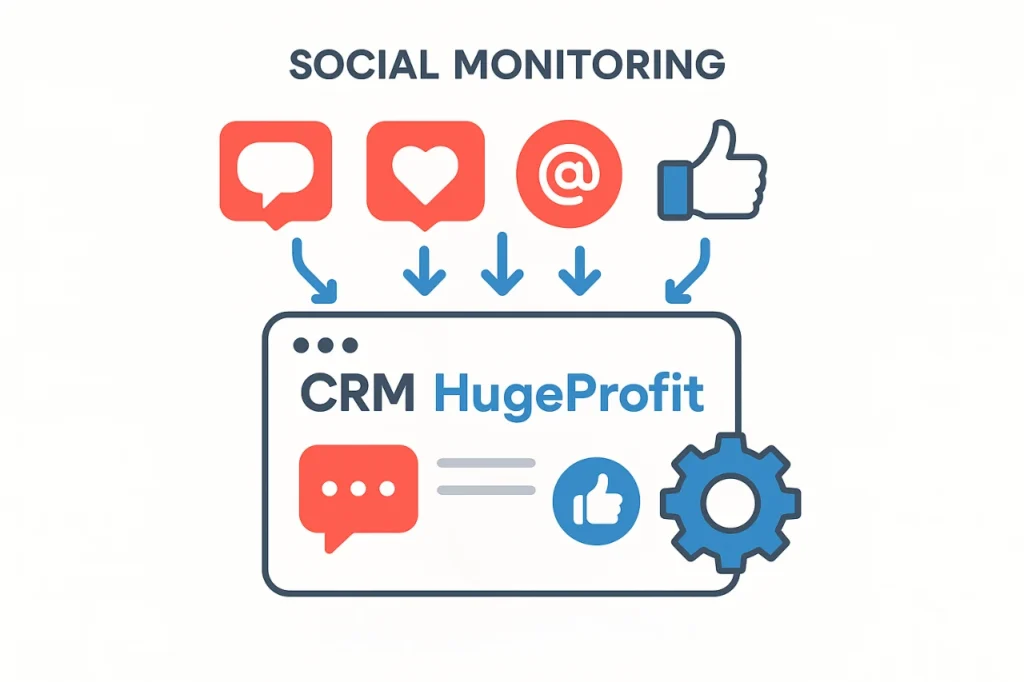
In an era where digital communication has become the primary form of interaction between brands and customers, companies need more than just a presence on social networks; they need full control over all customer contacts. This is where the need for a specialized solution—social CRM—arises. This is not just a regular customer management system but a tool designed specifically for working with dynamic and complex communication channels such as Facebook, Instagram, TikTok, Telegram, Viber, and others.
Monitoring activity on social networks is one of the main functions performed by social CRM. It automatically collects all incoming messages, comments, brand mentions, and reactions from various platforms into a single management panel. This helps avoid losing important inquiries, speeds up manager responses, and significantly improves service quality.
The next important block is the automation of work with social networks, which includes not only processing inquiries but also setting up template responses, chatbots, and intelligent request routing. For example, CRM can automatically send messages with detailed product information, generate feedback requests, or check product availability upon customer request. Such scenarios not only save employees’ time but also significantly enhance the customer experience.
Another advantage is data centralization. All interactions, regardless of the source, are stored in a single customer profile. This allows you to see the complete communication history, understand the interests, problems, and needs of each customer. Thanks to this, you can personalize communication and build loyalty.
Additionally, social CRM supports communication effectiveness analytics: you can see which channels generate the most inquiries, the response time of your managers, how many inquiries turn into deals, and much more. This data allows you to make informed decisions, optimize processes, and increase profitability.
Finally, it is important to note that automation of work with social networks is not just about speed. It is about scalability. Businesses can grow, serving many more customers without increasing staff, as most routine tasks are handled by the system.
Thus, the implementation of social CRM is a strategic step towards creating a systematic, efficient, and scalable customer service system on social networks.
Integration of Social Networks with CRM: How It Works in Practice
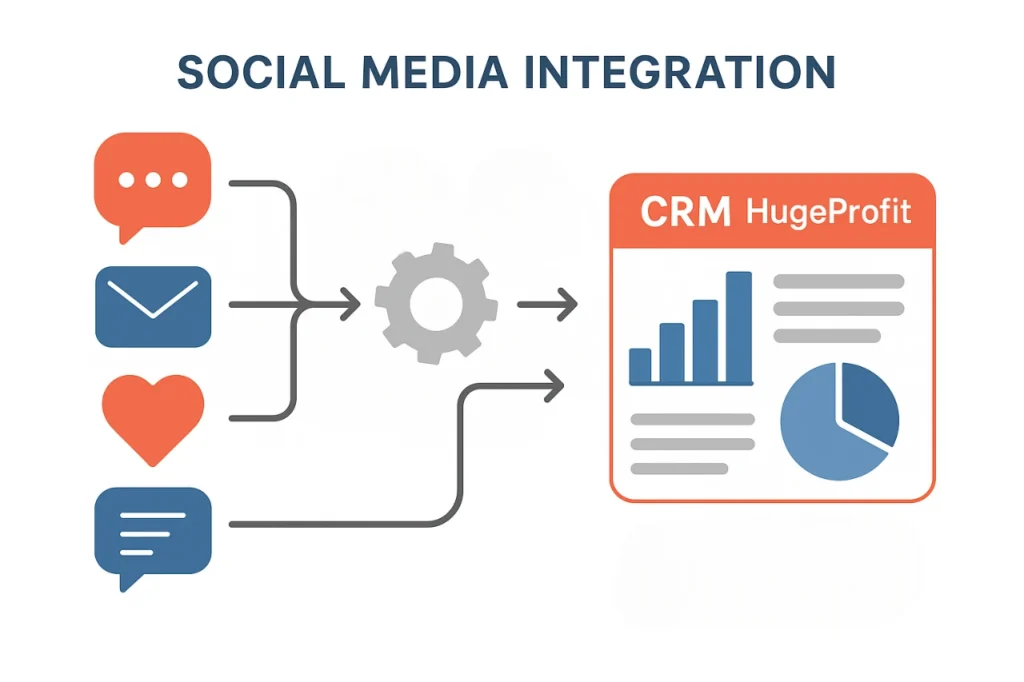
For businesses that actively communicate with customers on Facebook, Instagram, Viber, or Telegram, it is crucial to unify all inquiries into a single ecosystem. This not only helps maintain full control over communications but also avoids duplication, delays, or loss of potential customers. This is why the integration of social networks with CRM has become an indispensable tool for automating interactions.
In practice, integration works as follows: the CRM system connects via API to the selected social networks, after which all incoming messages, comments, reactions, and brand mentions are automatically fed into your CRM account. For example, if a customer sends a message via Instagram Direct, their inquiry instantly appears in the system, is assigned to a responsible manager, and is recorded in the interaction history.
Reverse integration is also possible: responses from managers in the CRM are immediately sent to the respective social network, and to the customer, it appears as regular communication in Facebook or Viber. Thus, all actions are performed from a single window, eliminating the need to constantly switch between tabs or devices.
One of the systems that implement this functionality is CRM HugeProfit. It supports integration with key social platforms, allowing businesses to combine communication channels, keep track of inquiries, launch auto-scripts, and obtain analytics for each message. For small and medium-sized businesses, this is an opportunity to organize all processes in a simple and understandable interface.
In addition to exchanging messages, integration of social networks with CRM allows obtaining additional customer data: name, profile link, photo, place of residence, history of previous inquiries. This information is automatically pulled into the contact card and helps the manager better understand the customer’s needs even before the dialogue begins.
Another important aspect is maintaining service continuity. Thanks to integration, CRM automatically records at which stage of the funnel the customer is, whether an offer has been made, if there are open tasks, or if the customer is waiting for a response. This makes it impossible to lose the dialogue even with a large flow of messages or a change of responsible employee.
Integration of social networks with CRM also opens up opportunities for building end-to-end analytics—you can see which channel receives the most inquiries, which posts or ads generate the most conversions, and the average duration of request processing in each channel.
In summary, technical integration is not just about “connecting Instagram to CRM“; it is a comprehensive process that allows for making customer interactions fast, transparent, and controlled. With systems like CRM HugeProfit, even a small team can handle hundreds of inquiries per day without losing service quality.
Automation of Message and Comment Processing in Instagram, Telegram, Viber
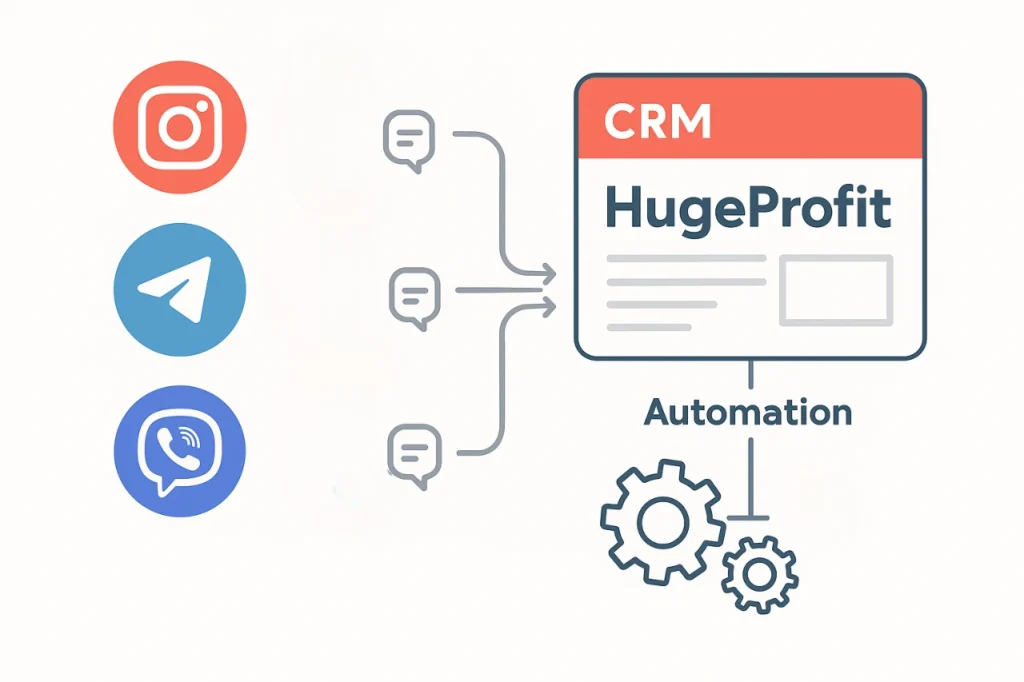
In today’s business environment, response speed plays a crucial role in customer communication. Potential buyers expect a response within minutes of reaching out, especially when it comes to messengers or social networks. This is why automation of message and comment processing is one of the main advantages provided by the implementation of a social CRM tool.
Platforms like Instagram, Telegram, and Viber are not just promotion channels but full-fledged entry points for customers into your business. People often ask questions in Direct, leave comments under posts, write to chatbots, or respond to stories. It is important that none of these inquiries go unnoticed, and this is where social network monitoring CRM helps.
The social CRM tool automatically scans your accounts on Instagram, Telegram, and Viber for new messages, comments, mentions, or reactions. All these actions are instantly recorded in the system, after which pre-configured scenarios are launched: sending a template response, creating a task for a manager, or forwarding the inquiry to the appropriate department.
For example, on Instagram, a customer left a comment under a post asking about product availability. The CRM system automatically reads this inquiry and, depending on the keywords, can send them a response in Direct or forward the request to a manager. On Telegram, everything works similarly—especially if the business uses a bot platform to receive inquiries: the CRM reads the entered data, creates a contact, and assigns a responsible person. On Viber, where communication is often less formal, it is important to respond promptly to any signs of interest—likes, comments, or emojis—and the system takes this into account.
Another advantage of automation is the ability to filter and sort inquiries. CRM allows you to set priorities: for example, highlight messages from regular customers or with certain triggers (such as the words “price,” “delivery,” “discount”). This allows the team to focus on the most important inquiries first.
It is also worth mentioning the automatic saving of correspondence history. Even if a customer writes on Instagram today and on Viber a week later, the CRM will combine all these communications into one contact, providing a complete picture of the interaction.
One practical example of such functionality can be found in CRM HugeProfit. The system supports automatic processing of inquiries from popular social networks and messengers, allows creating flexible response scenarios, and conveniently managing multi-channel communication with customers. This is especially relevant for small businesses, where it is important to maintain service quality without spending extra resources.
Thus, social network monitoring CRM and automation of inquiry processing are no longer just an option but a necessity for every business that wants to remain competitive in the digital environment.
Analytics in Social CRM: How to Assess Interaction Effectiveness
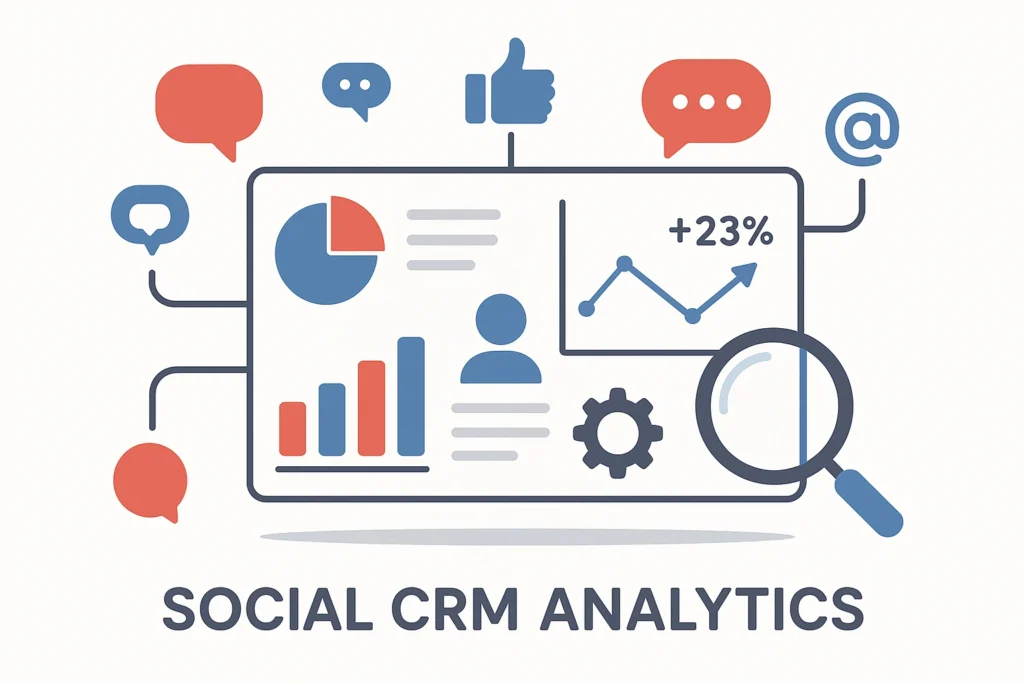
Evaluating results is an important component of any customer interaction strategy. Without clear analytics, businesses risk making decisions “blindly.” This is why social CRM provides tools that help not only communicate but also deeply analyze the effectiveness of these communications.
Analytics in social CRM systems allow you to see:
- how many inquiries come from each channel (Instagram, Telegram, Viber);
- how quickly managers respond to requests;
- which messages or comments turn into sales;
- which topics or posts generate the most customer activity.
Thanks to this, you can determine which channels provide the greatest return and where it is necessary to strengthen your presence or change your approach.
In the CRM HugeProfit system, for example, these reports are generated automatically and updated in real-time. Businesses can monitor KPIs, identify “bottlenecks” in communication, and make strategic decisions based on accurate data.
Analytics is not just numbers but a way to optimize all stages of customer interaction on social networks.
Mobile applications of the CRM system HugeProfit
Use all the advantages of a mobile device for inventory management:
– mobile barcode scanner
– adding sales in 2 clicks
– creating and tracking TTN
– controlling balances on Prom, Rozetka, OpenCart, Woocommerce, Khoroshop
– Many warehouses and employees
Examples of Using Social CRM in Small and Medium Businesses
In the realm of small and medium-sized businesses, responsiveness and service quality are crucial. When a customer writes in Direct or leaves a comment on Facebook, they expect an immediate response. This is why more and more entrepreneurs are implementing social CRM to systematize message handling, improve manager efficiency, and avoid losing leads. Here’s how it works in real-world niches.
1. Pet Shop
Customers constantly inquire on social networks about the availability of food, delivery times, or promotions. Thanks to the social CRM tool, such as CRM HugeProfit, the store has automated responses to frequently asked questions and also connected a Telegram bot for quick order processing. The CRM records each request and helps generate recommendations based on purchase history.
2. Cosmetics Store
Instagram is the main sales channel. Every day, dozens of inquiries come in regarding shades, product lines, or care selection. The CRM system automatically collects messages, creates a customer card, and assigns a manager. Additionally, CRM analytics allow you to see which posts generate the most interest and plan the next advertising campaigns more accurately.
3. Electronics Store
On Facebook and Viber, customers often ask for consultations on the technical specifications of products. CRM HugeProfit integrates with all channels, allowing you to record inquiries, quickly send template responses, and automatically create orders directly from the chat. This significantly reduces processing time and increases conversion rates.
4. Clothing and Footwear Store
A customer writes in Direct: “What size would fit a size 39?” – the CRM immediately pulls up the history of previous purchases, allowing the manager to provide personalized advice. Social CRM also automates messages about new arrivals or restocked items through messengers, which stimulates repeat purchases.
5. Building Materials Store
This is a niche with a long decision-making cycle. Customers may clarify specifications, request cost calculations, or wait for consultations. The CRM system allows you to record each stage—from the first inquiry on Instagram to closing the deal. Importantly, the CRM not only stores communication but also allows you to create tasks for follow-up calls or sending a measurer.
Criteria for Choosing a CRM System for Automating Work with Social Networks
Choosing the right CRM system is a strategic decision for businesses aiming to effectively work with customers on Instagram, Telegram, Viber, Facebook, and other social networks. In a world where communication is increasingly moving online, social CRM has become the main tool for processing inquiries, collecting data, and maintaining customer loyalty.
Here are the key criteria to consider when choosing a CRM for social networks:
1. Support for All Necessary Channels
Ensure that the chosen social CRM has ready integrations with the platforms where your business is present. These could be Facebook Messenger, Instagram Direct, Telegram, Viber, or other channels. The ideal option is if the CRM allows flexible connection of new communication sources.
2. Full Automation of Work with Social Networks
The best CRMs not only receive messages but also allow setting up automatic responses, creating triggers, and launching scripts. Automation should cover scenarios for processing requests, distributing inquiries, sending follow-ups, and saving communication history. If the system does not allow automating routine tasks, it is not a social CRM tool but just a messenger.
3. Real-Time Social Network Monitoring CRM
The tool should track activity across all connected networks: mentions, comments, likes, and reactions. It is important that this happens instantly, not with a delay, as even a few minutes can sometimes make all the difference.
4. In-Depth Analytics and Reports
Choose a CRM that allows you to track key metrics: the number of inquiries, response time, the number of processed requests, and sources of leads. This will enable you to evaluate the effectiveness of each channel and optimize your marketing strategy.
5. Ease of Use and Team Training
Even the most functional social CRM will not be useful if the team cannot quickly master it. The interface should be intuitive, with a minimum number of clicks required to respond or create a task.
6. Scalability and Localization
Choose a solution that “grows with you.” For example, CRM HugeProfit is adapted to the Ukrainian market, supports multi-channel communication, has a Ukrainian interface, and flexible settings. This allows you to scale accounting and communications seamlessly, even if you open 2-3 new stores or branches.
7. Price and Connection Terms
Budget always plays a role, but focus not only on cost but also on the price-to-feature ratio. Some services have hidden fees for connecting channels or limitations on the number of messages. CRM HugeProfit, for example, offers a transparent pricing model, which is convenient for small businesses.
Conclusion: Build Effective Customer Interactions on Social Networks Today
In conclusion, effective social CRM is not just about convenience but also a growth tool. Considering the above criteria, you can choose a CRM for social networks that fully meets your needs and helps build a systematic, automated, and profitable communication with customers.
If you are looking for a solution that:
- integrates with Instagram, Facebook, Telegram, Viber;
- provides real-time social network monitoring CRM;
- allows setting up automation of work with social networks;
- combines everything in a single system with analytics, customer cards, and interaction history.
then your choice is CRM HugeProfit!
👉 Connect CRM HugeProfit today and take your customer communication on social networks to the next level. Simple interface, full automation, transparent analytics, and Ukrainian support—everything your business needs for confident growth.
